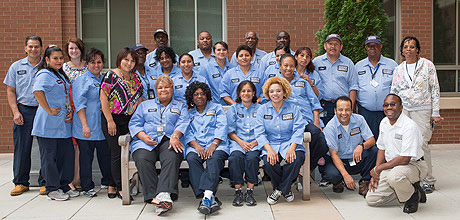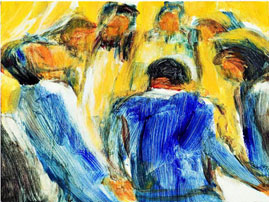
Serious Workers by Deborah Beach Giordano
The Housekeepers Fan Club
I love hospital cleaning ladies. Or “housekeeping staff,” as they are called these days. By any name, they hold a special place in my heart.
 The housekeeping staff are the rarely noticed and seldom recognized lynchpins of our health care system. They stand alongside nurses in my pantheon of medical heroes.
The housekeeping staff are the rarely noticed and seldom recognized lynchpins of our health care system. They stand alongside nurses in my pantheon of medical heroes.
Their work is not only demanding, it is often dangerous. Housekeepers are exposed to contaminated needle-sticks (when a rushed or thoughtless medico tosses a used syringe into the trash), infectious diseases, every kind of human waste and discharge, broken glass, bloody bandages — all the while dealing with rude patients, contemptuous visitors, self-absorbed physicians, and administrators whose major interest and concern is how to reduce their hours.
The housekeeping staff are the ones who restore the Emergency treatment room to sterile conditions after a stabbing victim has been brought in, and they clean the O.R. after every surgery. They replace the linens on the beds, mop the floors — and wash down the walls — when patients have vomited, had diarrhea, or hemorrhaged.
Not pleasant to imagine; and far less pleasant when encountered in real life. These are aspects of the housekeepers’ everyday working lives.
But not many people notice.
Steep Learning Curve
My appreciation for these amazing ladies (and gentlemen) began in earnest many years ago when I was employed at a large metropolitan hospital — while I was still pursuing my first career. The nurses’ union had called a strike which other unions were honoring by refusing to cross the picket lines. “Exempt” employees were called in to support the minimum professional staff required to keep the hospital functioning. So I, along with other paper-pushers like me, were sent to the floors to prepare the rooms for incoming patients.
It was an awakening.
 I managed to clean two rooms and part of a third before I stumbled down to the cafeteria where I sat, weeping over a cup of tea. I had never been so physically exhausted in my entire life. Nor so emotionally drained.
I managed to clean two rooms and part of a third before I stumbled down to the cafeteria where I sat, weeping over a cup of tea. I had never been so physically exhausted in my entire life. Nor so emotionally drained.
Rolling the cleaning cart along the hall, I had passed a family engaged in a heated argument over the responsibility for their ailing mother, saw a colleague wheeled into the ICU after cancer surgery, and rode down the service elevator alongside the body of an elderly man who had died on one of the medical floors. All this after I had changed linens, cleaned toilets, and mopped the floors (twice).
And nobody noticed.
Oh, the admitting office knew — they knew a room was available; but they knew nothing about the original condition of the room, or the outcome of the patient who’d been in it. She might have gone home with one of her squabbling children, or he might have been the man I accompanied on his final elevator ride; life or death was all the same: both resulted in a room that needed to be made available to a new patient.
Yet there, beneath it all — behind it all? above it all? — stand the cleaning ladies; making everything new again with persistent, back-breaking labor. We rarely think about them, and they do much of their work out of sight, but patients, staff, and visitors alike owe our lives to them.
The Lesson Continues
Fortunately for all concerned, the strike was resolved in a little over a week. Shortly afterwards I made a trip down to the Housekeeping Department to tell them how much I appreciated what they did. It seemed to me that their work didn’t receive adequate recognition (as it certainly hadn’t, from me, until a couple of weeks prior!). What I discovered there that morning surprised me even more.
I arrived early in order to catch the day shift before they set off on their morning rounds. The door was open and I could hear low voices inside. I passed through the outer office, glancing at the corkboard fluttering with safety precautions, job postings, and daily assignment sheets, and took note of the ancient green-metal desks and filing cabinets (this department had clearly missed out on the furniture upgrades our “upper” offices had recently enjoyed). The interior room held a table and several chairs, but no one was sitting in them. Instead, a small circle of women were standing to one side, holding hands and murmuring softly.
 They stopped when they saw me, and Inez looked up, “Just a minute, dear, and I’ll be right with you.” I sank into one of the chairs and listened as they continued. They were praying. These ladies were praying for the patients — they were praying for their patients; some by name, but all were included. Then they prayed for the the health care teams and, last (but not least), for the hospital administration.
They stopped when they saw me, and Inez looked up, “Just a minute, dear, and I’ll be right with you.” I sank into one of the chairs and listened as they continued. They were praying. These ladies were praying for the patients — they were praying for their patients; some by name, but all were included. Then they prayed for the the health care teams and, last (but not least), for the hospital administration.
I remember fighting back tears. Never once had it occurred to me to pray for those who entered the hospital; not as I read the transcripts of grievous injuries and critical ER admissions, not when ambulances screamed into the drive, or Codes were called — not even when I saw my co-worker transported, pale and weak, out of Surgery. Although I considered myself relatively religious, while I was at work, I was focused on my job: this was business — it had never occurred to me to pray.
Taking the Work Seriously
These women took their work seriously — not just their jobs as cleaning staff, but their calling to be Christians. They rightfully understood that our walk of faith is not “provincial”: it is not constrained by times or locations; it is not limited to Sundays or evening prayers, it is not confined to churches or chapels: wherever we are, we are to live as faithful, believing followers of our Lord. We are to walk in his Way. Always. Everywhere.
And ever since The Lesson of the Cleaning Ladies, I have been blessed to be able to hear that Jesus “prepares a room for us” with new ears. He’s been a member of the hospital housekeeping staff ever since.
The Way
Jesus said, “I am the way, and the truth, and the life.”
Jesus is the Way we are to live — every day, wherever we are.
Many Christians tend to treat the American ideal of “the separation of church and state” as an Iron Curtain between our secular lives and our private ones. When we are home or in church, prayer is fine and dandy; when we are at work, our faith and belief is set aside — pushed into the background, and basically forgotten.
Imagine having access to a gift that can comfort and heal and bless — and not using it!

This failure impacts our own lives as much as any others: when we set aside our call to Be Compassionate, our actions may not be kind. When we postpone following the Lord until 5 p.m., we may instead find ourselves following the money.
I am in no way suggesting that we should go out into the workplace and proselytize. Nobody wants to be preached at or harangued or “invited” to an evening Bible study. It is enough, surely, to Walk in His Way; to be thoughtful, kindhearted, merciful, generous, and gentle. Those are, I can assure you, rare qualities in our present world.
If we live as our Lord taught, life will change — our lives, certainly, but others as well. Our attitude and our actions will reflect the radiance of Christ; tensions will be reduced, peace will become a possibility, hope will start to blossom. Remember how it was with our early forebears: in a world of violence and chaos, their abundant courage and persistent love amazed and inspired those around them, “What is the cause of their hope?”
Our hope is in the Lord.
Virtual hugs and real-time blessings,
Deborah ✝
Suggested Spiritual Exercise
Remember to pray.